"(Authorities) are doing the same as (in) Saddam's time and worse," former interim Iraqi Prime Minister Ayad Allawi told the London Observer, of human-rights abuses by the U.S.-backed Iraqi government. "It is an appropriate comparison. People are remembering the days of Saddam. These were the precise reasons that we fought Saddam, and now we are seeing the same things." Allawi, one of Hussein's victims, became a trusted CIA asset and later was handpicked by the United States to be the leader of the new Iraq. He now is the leading secular alternative to the Shiite theocrats expected to win the Dec. 15 election.
Amazingly, in Bush's Iraq, just as in Hussein's, you're either a victim or a victimizer -- often both. The grim ironies of this Darwinist nightmare are everywhere. For example, while the military is defending the use of white phosphorus on the battlefield -- "shake and bake," in U.S. military slang -- by citing chemical weapons restriction loopholes, it can't look good to the world that one of the human-rights crimes Hussein himself is charged with is, you guessed it, shelling Kurdish rebels and civilians with chemical weapons in 1991.
Source: "Bush accomplishes mission impossible" by Robert Scheer - Creators Syndicate - 11.30.05
Saddam repressed Islamic politics, so under him, Iraq was one of the most secular countries in the Middle East. It has become far more fundamentalist since the U.S. took over.
The back-to-burka trend has been widely reported throughout Shiite-dominated southern Iraq, and young women activists told The Los Angeles Times that their mothers had more freedom in the 60's.
Najla Ubeidi, a lawyer in the Iraqi Women's League, agreed: "During the 1960's, there was a real belief in improving women's conditions. We could wear what we liked, go out when we liked, return home when we liked, and people would judge us by the way we behaved."
If W. liked exercising his mind as much as his body, he could see that his mission to modernize Muslim countries is backfiring on women. The most painless way for Muslim men to prove that they have not abandoned Arab culture and adopted Western ways is to tighten the burka.
To us, the "liberated" but repressive Iraq is a paradox. To the women, it's a prison.
Source: "Reformer Without Results" By MAUREEN DOWD - NY Times - August 13, 2005
The day American troops entered Baghdad, Mr. Cheney told the American Society of Newspaper Editors that Iraq would be able to produce as much as three million barrels a day, "hopefully, by the end of the year."
Still more optimistic forecasts predicted that Iraqi production would climb to six million barrels a day within five years, and provided more fodder to the theory that American troops went into Iraq to break OPEC's back, weaken the Saud dynasty and reduce the kingdom's oil-based influence.
Of course, these predictions turned out to be wrong. Iraq's production is struggling at two million barrels a day because of the relentless targeting of pipelines and infrastructure by the insurgency. Exports lag prewar levels.
Source: "Why America Is More Dependent Than Ever on Saudi Arabia" By JAD MOUAWAD - NY Times - 8/6/05
[Newsweek war correspondent Joe] Cochrane says he has "always been something of an optimist" but reached his "breaking point" during his recent visit to Iraq. "Say what you will about whether the United States was justified to invade this country," he wrote. "We’re well into the game, and it’s too late to argue over who got the ball first. But prior to April 2003, there were no suicide bombers in Baghdad, there was 24-hour electricity and people went out at night. Now, if you drive into town from the airport, there is a legitimate possibility you will get killed."
Source: "War is Fun as Hell" by Sheldon Rampton (via Center For Media and Democracy) - 7/27/2005
The Shiite leaders... already draw support from Iran as well as the United States in the face of the deep Sunni Arab resentment that has fed the insurgency here. Their political parties have historically had much stronger ties to Iran than to the United States, which, as they vividly recall, did nothing while Saddam Hussein slaughtered up to 150,000 Shiites who rebelled after the 1991 gulf war.
The reality... is that Iraqi leaders, with the encouragement of their Iranian counterparts, are trying to forge stronger bonds with Iran in many spheres, from reconstruction to the writing of the constitution.
[A] shadow of theocracy can be seen in the religious language that the Shiite leaders have championed in recent drafts [of the Iraqi constitution]. One calls for Islam to be "the main source" of legislation, and includes a measure that appears to substantially change a 1959 civil law that guarantees some protection for women's rights. It also bestows special status on top Shiite ayatollahs.
[T]he current course of Iraq's most powerful elected leaders could end up producing a Shiite religious state, perhaps serving as a proxy for Iran.
[A] few more heated battles over the role of Islam could leave some Americans tempering their distaste for the brand of secular Sunni Arab nationalism that was discarded along with Saddam Hussein.
Source: "Iraq Dances With Iran, While America Seethes" By EDWARD WONG - NY Times - July 31, 2005
Saddam Hussein was a brutal dictator, to be sure, but he ruled as a militant secularist, who gave Christians and members of other religious and ethnic minorities positions of power and authority within the governments he assembled. Hussein saw the rise of Osama bin Laden and al-Qaida as a threat, and he meticulously -- sometimes violently -- kept that threat out of Iraq. To the extent that elements of al-Qaida are now on the ground in that country, it is not as a result of Hussein's invitation but as a result of his removal.
The point here is not to defend Hussein. The point is to recognize reality: The invasion and occupation of Iraq did not control the spread of terrorist activity in the Middle East. It handed the terrorists new opportunities for recruitment, and it gave them new territory in which to operate. Until the president acknowledges these fundamental realities -- and his own responsibility for making things worse -- it will be impossible to undo the damage.
George Bush set out to deceive to the American people Tuesday. That was morally wrong, and tactically foolish.
Source: "The Big Lie" by John Nichols - The Nation - 6/29/05
Two Years Later
One of the few positive domestic consequences of the war has been the nation's determination -- despite obstruction from the White House and its supporters -- to honor the memory of each American man and woman who has died in Iraq. The administration has been shockingly callous about the tens of thousands of Iraqi victims, whom ordinary Americans cannot count let alone name.
There were no weapons of mass destruction to destroy. Worse, the specialized machinery and highly lethal conventional weaponry that Saddam Hussein did control was looted during the invasion and is now very likely in the hands of terrorists. [A]mong the things missing is high precision equipment capable of making parts for nuclear arms. The WMD argument was not only wrong, but the invasion might have also created a new threat.
America's alliances, particularly those with Europe, have been severely frayed since President Bush trned his back on the United Nations in the fall of 2002. Even some of his early supporters, like Spain, have edged away. Tony Blair remains the exception, mainly because of his willingness to ignore public opinion. If there is such a thing as the European street, anti-American feeling is strong and universal.
Things are even worse on the Arab street. While hope for change may be rising, opinion about the United States has never been as profoundly negative. Even under the best circumstances, it would have been hard for the proud people of the Middle East to acknowledge any benefit from an armed intervention by a Western power. And the occupying forces have made themselves easy to hate with maddening human-rights disasters. When the average Egyptian or Palestinian or Saudi thinks about the Americans in Iraq, the image is not voters' purple-stained fingers but the naked Iraqi prisoner at the other end of Pfc. Lynndie England's leash.
The atr0ocities that occurred in prisons like Abu Ghraib were the product of decisions that began at the very top, when Bush administration decided that Sept. 11 had wiped out its responsibility to abide by the rules, including the Geneva Conventions and the American Constitution. For the United States, one of the greatest harms from the Iraq conflict has been the administration's willingness to define democracy down on the pretext of wartime emergency.
Mr. Bush was not honest with the American people in the run-up to the war. He hyped the WMD evidence abroad and played down the cost at home. Mr. Bush's determination to have his war and his tax cuts at the same time meant masking the real price of invading Iraq, and even now the costs are being borne mainly by overseas holders of American debt. The international markets know this, and over the long run are most likely to be less forgiving than American voters.
It is hard to imagine a quick exit that would not make things much worse. But at the same time, it's clear that a presence of American troops is poisoning the situation. Under constant fire from Sunni insurgents, the soldiers are seldom free to provide the good-will services that many would undoubtedly like to do. Instead the stand behind barricades, terrified that the next vehicle will be driven by a suicide bomber. The inevitable consequence is what happened to the Italian journalist and her protectors whose car was riddled with bullets en route to the airport. Far more often, the people inside the cars are Iraqis.
The invasion has stirred up other dreadful side effects that must be addressed. One is that other rogue nations watched what happened to Saddam Hussein and not unreasonably too the lesson that the only way to keep American forces away permanently was to acquire nuclear weapons quickly. Curbing the international market of the most lethal weapons must be the top priority for the White House, but it is not possible without the multilateral cooperation they scorned before the invasion. North Korea, which any sensible person regards as far more deadly threat than Saddam Hussein ever was, can be kept in check only by allies working together.
Source: "Two Years Later" New York Times - 3/18/05
How could we have removed one of the most vile and brutal dictators in the world from a country and still incurred the wrath of the people of that country? Hussein brutalized the people of Iraq for decades. Iraqis were initially exuberant at his ouster. What has happened during the last year to sour them on the presence of American power and influence in their country?
Could it be that their native resources, combined with what little of the allocated foreign aid that's actually been released, have been turned over to unaccountable American contracting companies while the Iraqi unemployment rate continues to hover at over 60%?
This is the one we hear over and over: "If you were in charge, Saddam Hussein would still be running Iraq." Or, "Would you rather Saddam was still in charge in Iraq?" or the various permutations.
The question isn't simply would we rather have Saddam still running Iraq. The question is would we rather have Saddam still running Iraq if we could reverse the horrible events that have occurred since this invasion began. Undeniably the answer is yes.
If we could bring back the lives of the 1000+ U.S. soldiers that have been killed, restore the 7,000+ that have been maimed, burned, disfigured, etc., not to mention the 10,000 to 17,000 Iraqis that have been killed, restore our prestige and good standing around the world (such as it was), heal the deep divisions in our nation that this war has caused, erase the images of tortured prisoners from the world press, and replace the billions of dollars that have been extracted from American taxpayers, then yes, we would be better off if Saddam had been left in place.
By analogy, if you have a splinter in your finger, that's bad…no argument there. You'd be better off without the splinter, no question. But if someone cuts off your finger to solve the problem, the net result is bad. They may say "The splinter was bad, Right?" "Yes." "You got rid of the splinter, right?" "Yes." "Then you're better off, so quit complaining." That argument only serves to obscure the larger issue. The remedy did more harm than the condition it remedied. Hussein was the splinter. The invasion/occupation of Iraq was cutting off the finger. Yes, Hussein was bad, but the net result of the remedy is worse than the original problem. Arguing that the splinter is gone doesn't justify the cure.
Ghassan Al-Atiyyah, leader of the Iraqi Foundation for Development and Democracy, said…"The nation is worse off than it was under Saddam. There is widespread disillusionment and distrust."
Unemployment remains acute, with estimates ranging from 28 percent to 45 percent. Oil production and exports lag behind prewar levels, as does electricity generation.
[Foreign donations have] failed to restore Iraq's oil production and exports to prewar levels. Electric power falls short of demand by one-third -- which means that on most days, families can expect to have four to 10 hours of electricity. Nearly all of Iraq's sewage still flows untreated into the Tigris and Euphrates rivers.
Before the war, Iraq was producing between 2.8 and 3 million barrels [of oil] a day… Production in May [2004] averaged 1.9 million barrels a day. Tuesday's [6/15/04] pipeline bombings -- the latest in more than 80 attacks on oil facilities -- choked off nearly 1 million barrels a day in exports.
U.S. Comptroller General David Walker, head of the Government Accounting Office, told Congress on Tuesday [6/15/04] that the reconstruction effort suffered from bureaucratic weaknesses at the Pentagon. "We're spending over $1 billion a week, and the accounting records are abysmal," he said.
Source: "Economy sees little improvement - Unemployment a problem; exports below prewar levels" by Jim Landers - Dallas Morning News - 6/20/04
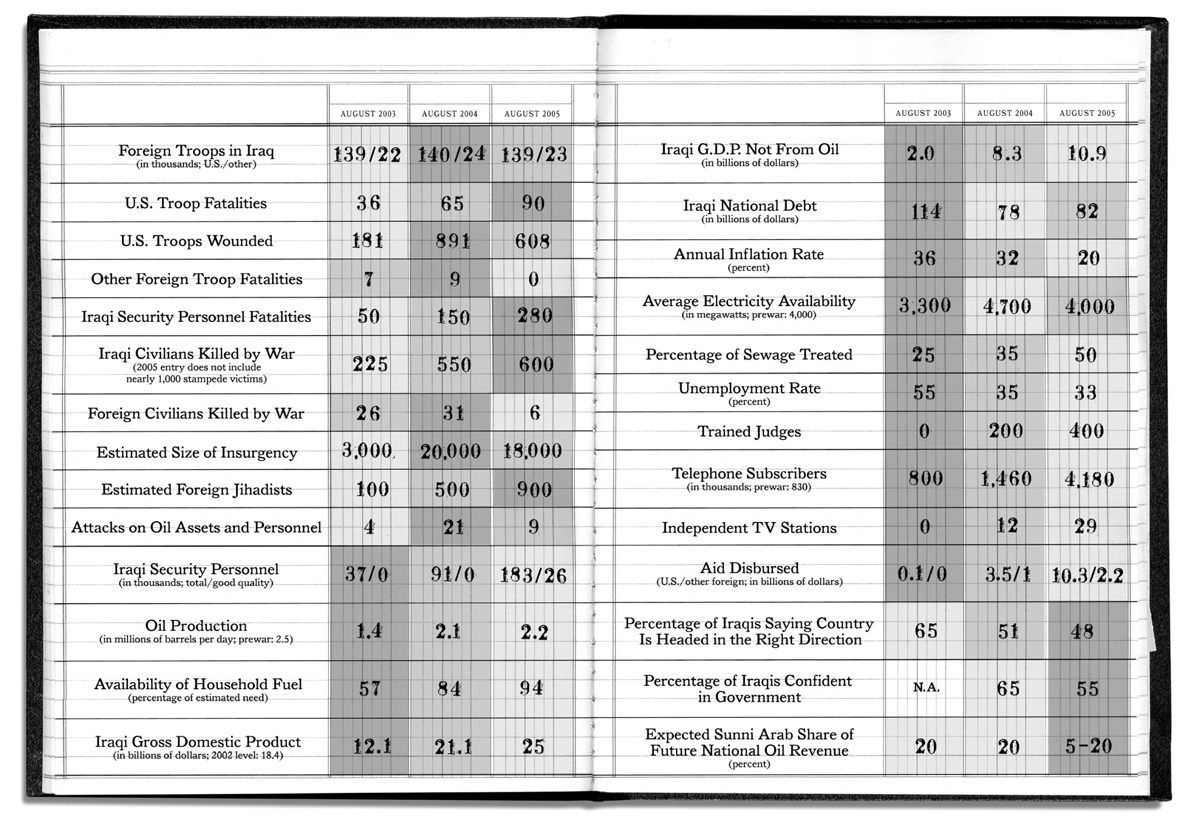
Source: NY Times - 9/9/05 - Nina Kamp, Michael O'Hanlon and Amy Unikewicz
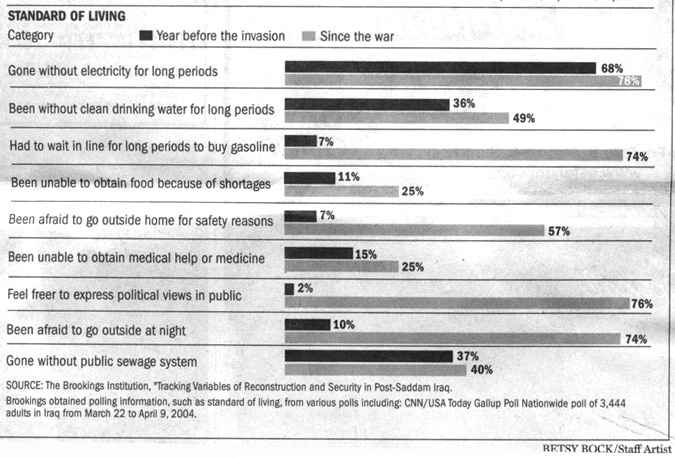
Source: Dallas Morning News - 6/20/04
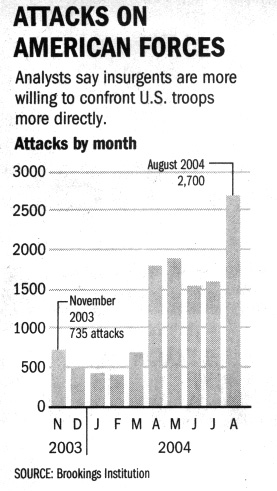
Source: Dallas Morning News - 9/19/04
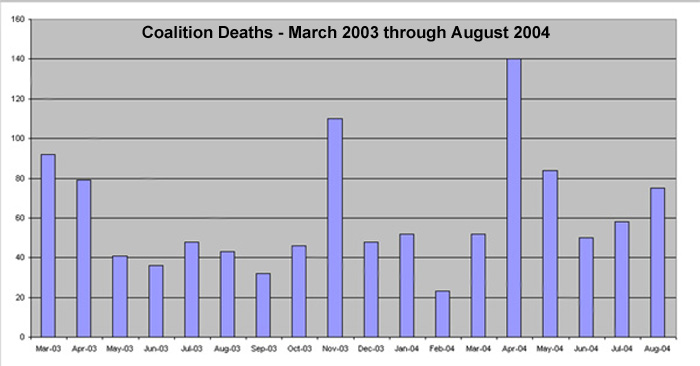
Source: http://icasualties.org
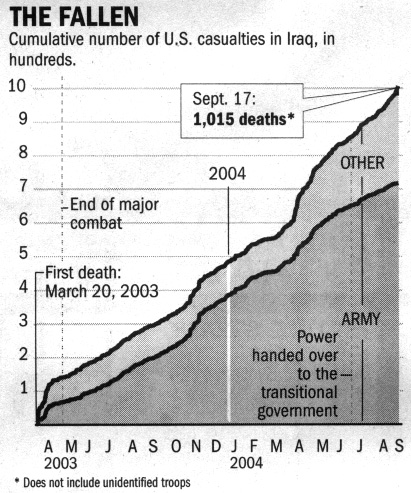
Source: Dallas Morning News - 9/19/04
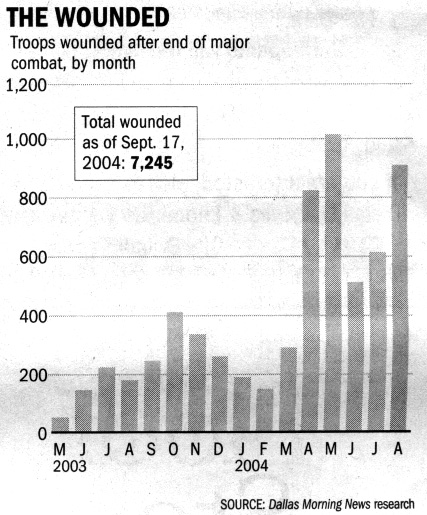
Source: Dallas Morning News - 9/19/04
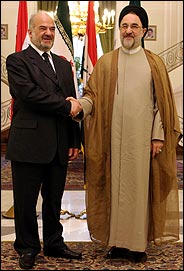
Iraq's prime minister, Ibrahim al-Jaafari, left, getting a helping hand in Iran from President Mohammad Khatami.
Source: Photo: Vahid Salemi/Associated Press via NY Times